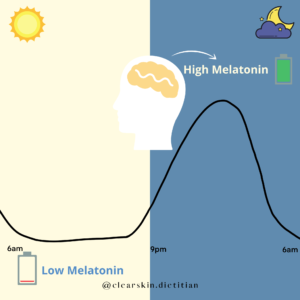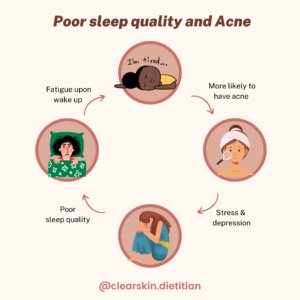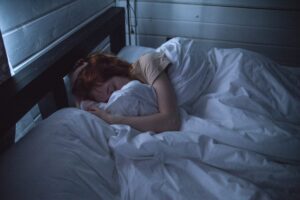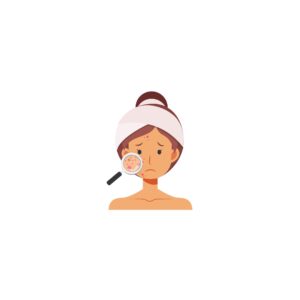If you are not sleeping enough, the chances of getting acne increase due to some factors such as stress, hormone changes, depression & anxiety etc. That’s the reason why you sometimes see 1 or 2 pimples pop up and have puffy eyes when you wake up without an enough sleep.
Why & How lack of sleep causes acne
1. Cortisol
Cortisol is a stress hormone produced by the hypothalamic pituitary adrenal axis (HPA). Hypothalamus and pituitary gland are in brain while adrenal glands are in kidneys. Sleep deprivation increases stress [1], HPA axis release cortisol which increase pro-inflammatory cytokines. Studies have shown that cytokines promote comedogenesis (= blackhead formation) [2]. Rise in cortisol also increase blood sugar level (BSL) and systemic inflammation. Inflammation cause sebaceous gland to overproduce sebum/ oil, thus pores are clogged and ultimately become acne [3].
2. Melatonin
Melatonin is a hormone secreted by the pineal gland of the brain, inducing sleep and improving sleep quality which can also suppress the synthesis of androgen hormones [4]. Androgen is a male hormone which increase oil production and possibly clog pores. Due to the sleep-wake cycle, melatonin levels start to increase in the evening. However, melatonin is very sensitive to light which means exposure to light at night can block melatonin [4]. Some indoor sources of blue light are phone/ laptop screen, LED light, light bulbs [5]. For example, if you use your phone before sleep, the blue light of screen will suppress melatonin which delays the time you fall asleep.

3. Weaken skin barrier
Skin is the largest organ in human body which protect us from UV damage and maintain temperature [6]. Study has shown that lack of sleep reduce skin integrity such as affecting collagen type VI production in skin cells and slow down wound healing process.
4. Depression & anxiety
For easy understanding, I have create a cycle to show the relationship between sleep quality, depression/ anxiety and skin health. We can see they are really interrelated.

Studies have shown a strong relationship between acne and fatigue after wake up [7,8]. Fatigue may be a sign of depression/ anxiety which highly affect quality of life. People with acne may not sleep very well at night as they are more stressed compared to those without acne.
[1] Wright Jr KP, Drake AL, Frey DJ, Fleshner M, Desouza CA, Gronfier C, Czeisler CA. Influence of sleep deprivation and circadian misalignment on cortisol, inflammatory markers, and cytokine balance. Brain, behavior, and immunity. 2015 Jul 1;47:24-34.
[2] Tanghetti EA. The role of inflammation in the pathology of acne. The Journal of clinical and aesthetic dermatology. 2013 Sep;6(9):27.
[3] Elsaie ML. Hormonal treatment of acne vulgaris: an update. Clinical, cosmetic and investigational dermatology. 2016;9:241.
[4] Harlim A. The Relationship Between Sleep Quality and Students’ Acne Vulgaris Severity at Medical Faculty Universitas Kristen Indonesia. Journal Of Advanced Research in Dynamical and Control System. 2020.
[5] Available from: https://www.webmd.com/sleep-disorders/sleep-blue-light
[6] Kahan V, Andersen ML, Tomimori J, Tufik S. Can poor sleep affect skin integrity?. Medical hypotheses. 2010 Dec 1;75(6):535-7.
[7] Schrom KP, Ahsanuddin S, Baechtold M, Tripathi R, Ramser A, Baron E. Acne severity and sleep quality in adults. Clocks & Sleep. 2019 Dec;1(4):510-6.
[8] Misery L, Wolkenstein P, Amici JM, Maghia R, Brenaut E, Cazeau C, Voisard JJ, Taïeb C. Consequences of acne on stress, fatigue, sleep disorders and sexual activity: a population-based study. Acta dermato-venereologica. 2015 Apr 1;95(4):485-8.

